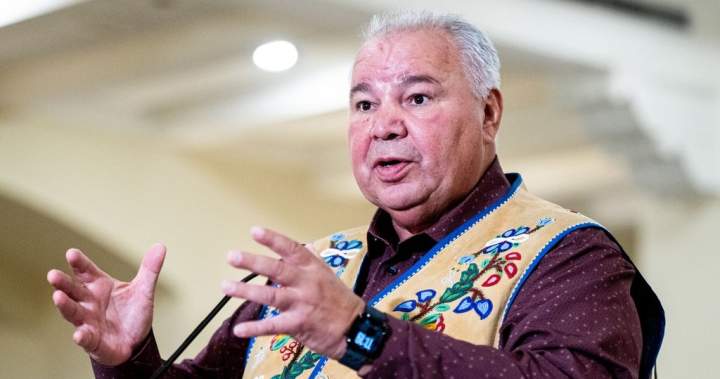Indigenous groups question government funding for Métis Nation of Ontario

First Nations in Ontario and the Manitoba Métis Federation say nearly $1 billion in federal funding went to a group they allege is fraudulently claiming Métis identity.
The Chiefs of Ontario, which represents 133 First Nations in the province, shared with The Canadian Press data on more than 20 years worth of federal funding provided to the Métis Nation of Ontario.
It suggests that $819,836,061 went from Ottawa to the MNO — an organization First Nations leaders say has no legitimacy and threatens their rights.
“This data shows just how badly First Nations in Ontario are being harmed by the diversion of government funding to the MNO and away from the needs of First Nations and other legitimate groups,” the Chiefs of Ontario said in a media statement.
“The question is, why is the Crown sending hundreds of millions of dollars to the MNO when there is overwhelming evidence contradicting their claims?”
The data indicates the money came from several federal departments, including Indigenous Services Canada, Crown-Indigenous Relations, Parks Canada and Environment and Climate Change Canada.
The MNO also received funds from the Canadian Nuclear Safety Commission and the Impact Assessment Agency related to the potential impacts of projects in their communities.
The conflict between First Nations, some Métis groups and the MNO stems from a 2017 decision by the government of Ontario to recognize six “new, historic” Métis communities in the province — and a 2023 federal government bill, which never passed, that would have affirmed the MNO’s right to self-government.
First Nations and other Métis groups say the communities represented by the MNO have no claim to Métis heritage and Ottawa and Ontario have no right to recognize them.

Last month, history professor Leila Inksetter of the University of Quebec in Montreal released a report drafted on behalf of the Wabun Tribal Council that concluded there is no evidence of a mixed-ancestry community in the Wabun Tribal Council’s territory in northeastern Ontario.
The MNO rejected that report, saying that despite years of outside attempts “to discredit” it, “nothing has changed.”

Get breaking National news
For news impacting Canada and around the world, sign up for breaking news alerts delivered directly to you when they happen.
“The facts of history will not change because a new ‘expert’ has been paid to peddle the same Métis denialism,” the group said in a media statement.
The MNO has cited a 2003 decision by the Supreme Court of Canada to recognize a Métis community in and around Sault Ste. Marie, Ont. The case did not consider the six new communities recognized in 2017, but rather what may constitute a Métis right.
Another report, published last month and commissioned by Saugeen Ojibway Nation, also concluded there is no evidence of a distinct Métis community in their territory in southwestern Ontario.
“The historical evidence simply does not support this claim,” says the nearly 200-page report, written by two historians at the University of Toronto.
While the report says there were “certainly individuals and families of mixed ancestry” in the region, that can’t form the basis of a claim to a distinct community within Saugeen Ojibway Nation territory.

Jennifer St. Germain, MNO chief strategy officer, said Métis and First Nations “should not be working at odds as we are not enemies.”
“We have worked together throughout our shared history to push colonial governments to respect the rights of Métis and First Nations peoples, to properly invest in the programs that matter to our families and communities, and to uphold the honour of the Crown,” she said.
“When the MNO and Ontario First Nations work together, we make real change for the better for our children, families, and communities, as well as our lands and waters.
“It’s time to get back to the table rooted in our shared values of honesty, truth, and respect.”
The Chiefs of Ontario says that the academic research “merely reaffirms reality.”
“Not only are Ontario and Canada refusing to consult First Nations, they refuse to share the research they relied on or acknowledge the growing body of research and take steps to fix their mistakes,” the Chiefs of Ontario said in a media statement.
“It is extremely disappointing that Canada and Ontario … failed to do any adequate research before recognizing the MNO.”
Open disputes over claims to Métis heritage came close last year to ripping apart the Métis National Council, which once acted as a national voice for Métis but now has just two provincial members.
The Métis Nation-Saskatchewan withdrew from the Métis National Council last September, citing concerns about the MNO and claiming the council had failed to ensure the integrity of its citizenship registry.

The Métis Nation British Columbia withdrew from the council shortly after, saying it had lost confidence in the council’s ability to serve as a national advocacy organization.
Their departure came years after the Manitoba Métis Federation withdrew from the council, citing similar concerns.
Will Goodon, the Manitoba Métis Federation’s minister of identity protection and inter-Indigenous affairs, said the amount of public money available to Métis communities is limited and should not be shared with bodies that are not connected to what he calls the historic Métis Nation — largely recognized as descendants of the Red River communities in Manitoba.
One Parks Canada grant received by the MNO was meant to allow the organization to secure land and “support creation of an ecological corridor in the region along the north shore of Lake Superior,” says a federal document.
Goodon said that type of funding raises red flags for both Red River Métis and First Nations concerned about the prospect of the MNO seeking land in their territories.

The Manitoba Métis Federation said it’s also troubled by the fact that the federal government last week invited MNO leaders to a meeting to discuss its controversial major projects legislation.
The federation, which boycotted that meeting, said the MNO’s invitation undermined the integrity of the gathering and put the government’s major projects agenda at risk.
“Canada and Ontario are pushing pro-development agendas. They say they will consult with ‘Indigenous communities’ but, in Ontario, the only consultations that should occur are with the rights holders — First Nations,” the Chiefs of Ontario said in a media statement.
“Pan-Indigenous approaches do not work and only devalue the true rights holders.”
© 2025 The Canadian Press


Spirits maker Diageo will cease operations at its bottling facility in Amherstburg, Ont., early next year, as it shifts some bottling volume to the U.S., the company announced on Thursday.
The facility, which bottles Crown Royal products, will close in February in a move aimed at improving its North American supply chain.

Get breaking National news
For news impacting Canada and around the world, sign up for breaking news alerts delivered directly to you when they happen.
About 200 jobs will be affected.
“This was a difficult decision, but one that is crucial to improving the efficiency and resiliency of our supply chain network,” Marsha McIntosh, Diageo’s president of North America supply, said in a statement.
Diageo said it will engage with the community and find ways to support its employees through the transition, and work alongside Unifor to assist unionized workers.
The company said it will still maintain a “significant” footprint in Canada — including its headquarters and warehouse operations in the Greater Toronto Area, and bottling and distillation facilities in Manitoba and Quebec.
McIntosh added the company’s Crown Royal products will continue to be mashed, distilled and aged at its Canadian facilities.
© 2025 The Canadian Press

Toronto police say a 33-year-old man has been charged with attempted murder after allegedly striking two men with his car Wednesday evening.
Officers say they responded to reports of a collision in the area of Don Mills Road and Gateway Boulevard in the city’s North York neighbourhood just before 10:30 p.m.

Get daily National news
Get the day’s top news, political, economic, and current affairs headlines, delivered to your inbox once a day.
Police say two men got into an argument, leading to one man getting into his car and hitting the other man with it.
They say the man then put his car into reverse, striking a second man.
A man in his 50s was transported to hospital with serious injuries and the second man, in his 20s, had minor injuries.
Police say the suspect from Markham, Ont., faces several other charges as well, including two counts of assault with a weapon, uttering threats and dangerous driving.
© 2025 The Canadian Press

A court document shows a Lindsay, Ont., man facing charges for allegedly breaking into an apartment was carrying a crossbow when he was confronted by a tenant.
The resident, Jeremy David McDonald, is also facing assault charges in the incident on Aug. 18 — a fact that has generated widespread interest in the case.
Police information filed in court alleges that Michael Kyle Breen damaged a window and screen at McDonald’s home and carried a crossbow.
The court document says the 41-year-old Breen is charged with break and enter, possession of a weapon for a dangerous purpose, mischief under $5,000 and failing to comply with a probation order.

Get daily National news
Get the day’s top news, political, economic, and current affairs headlines, delivered to your inbox once a day.
Police have said that Breen, who is scheduled to appear in court for a bail hearing next week, was already wanted for unrelated offences.
McDonald, the 44-year-old resident, was charged with aggravated assault and assault with a weapon after he allegedly “did endanger the life” of Breen.
Premier Doug Ford blasted the decision to charge the apartment resident, saying last week that it shows “something is broken.”
Kawartha Lakes Police Chief Kirk Robertson wrote in a statement Wednesday that he recognizes the incident has generated significant public interest and “emotional” responses, but called some of the reaction “unjust and inaccurate.”
Robertson wrote that individuals have the right to defend themselves and their property, but the law requires that any defensive action be proportionate to the threat faced.
“This means that while homeowners do have the right to protect themselves and their property, the use of force must be reasonable given the circumstances,” he wrote.
© 2025 The Canadian Press
-

 Uncategorized3 months ago
Uncategorized3 months agoShop Proud, Eat Proud, Be Proud — Ottawa Canada Day Market This June 28th
-

 3 months ago
3 months agoCanada’s world junior trial saw juries tossed, intense testimony. Here’s a recap
-

 3 months ago
3 months agoMeasles circulating in northeastern B.C. community, health officials warn
-

 2 months ago
2 months agoRing of Fire road to bring prosperity to First Nation, problems for caribou: report
-

 3 months ago
3 months agoAnishinabek Nation chief says he briefed Ontario police on protests against Bill 5
-

 2 months ago
2 months agoFormer major leaguer, Jays doctor Ron Taylor dies
-

 2 months ago
2 months agoJagmeet Singh apologizes for attending Kendrick Lamar concert after Drake calls him out
-

 2 months ago
2 months agoDreaming of a lakeside cottage but can’t afford it? Co-ownership could open that door





